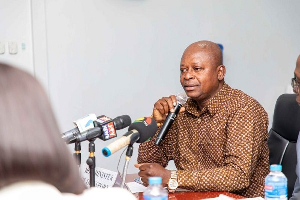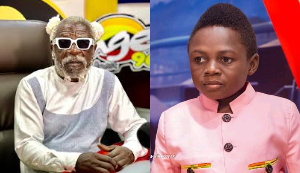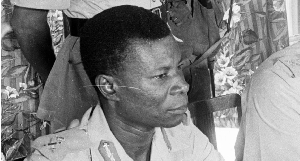National Reform Party Media Statement Combating The Illegal Narcotics Industry In Ghana
The “Hollywood-style” drama unfolding in Ghana: tonnes of uncut cocaine stored in plush residential areas in Accra; Latin American drug lords and their mysterious mistresses with million-dollar budgets for bribing public officials; corrupt police officers and even Columbian “hit men” is deeply worrying. Our shock must not distract us from analysis of our situation and from action. It is important to step back from the sensational details and assess the big picture:? Ghana has become a regular and possibly major bulk breaking point for the global trade in illegal narcotics.
? Highly placed officials of all three branches of Government but especially our security services are facilitating and possibly directing the narcotics trade.
? Substantial quantities of narcotic drugs are finding their way into our society. Drug dealers are addicting, enslaving and killing our children. They are trapping our confused and desperate youth into smuggling narcotics abroad in the hope of quick cash. Drug dealers are increasing our exposure to communicable and deadly diseases like HIV/AIDS. Drug dealers are radically escalating the level of violent crime in our society.
Our view is that this situation is a logical outcome of the policies pursued by our governments over the last 20 years. At least since the adoption of the Structural Adjustment Programme our national social and political elite have committed to the relentless unregulated pursuit of personal wealth, mostly riding on the coat tails of “foreign investors”. The result is a society where personal wealth, whether acquired by rural genocide, public corruption, drug dealing or other criminal activity is considered self-legitimising and worthy of praise!
Our leaders are completely insensitive to the growing gap between the handful of super-rich and the millions of utterly poor. Our media lauds mining “investors” for raping our environment and displacing and exploiting our vulnerable rural folk. We collectively condone public officials’ indulgence in presidential jets, motorcades, palaces and incessant lavish foreign travel - lifestyles that we all know neither they nor we can afford. Worse, we watch as they undermine the independence and professionalism of public institutions - civil service, police, judiciary, universities etc. to facilitate their greed and impunity. We have in short, created a society that is easy prey to “foreign investors” like Vasquez Gerardo Duarte David (or whatever his real name is) and their local associates.
Given the Kufuor government’s commitment to “private sector led growth”, we cannot expect a holistic or radical response to this crisis. However, even from a neo-liberal perspective, the official response is worrying. For example, Ghana has fifty years of experience in conducting sensitive investigations. What then explains the structural weakness of the Justice Wood committee? If Government deemed the investigation sufficiently important to require the leadership of “a whole Supreme Court Judge” then why was it not set up as a Commission of Inquiry under Article 278 of the Constitution? Did Government seriously not think that the Wood committee needed powers to compel witnesses to testify under oath, demand production of documents and even examine witnesses abroad? Did Government not think this Supreme Court judges findings deserved the evidentiary status of High Court findings? Did Government not wish to provide committee members and witnesses the immunities that they would have enjoyed in a trial before a high court? Obviously, Government was not keen on public sittings – again a feature of constitutional Commissions of Inquiry. It is difficult to avoid the conclusion that Government either does not appreciate the seriousness of the problem or is not committed to exposing the truth to the public. President Kufuor’s long silence followed by a series of most unfortunate remarks only strengthens this impression. It is simply unacceptable for a President to suggest that this crisis is insignificant compared to his “achievement” in securing the MCA. It is also unacceptable to cast such a major systemic failure as a petty partisan issue, rather than the national crisis it is.
Beyond this, the scope of the Wood Committee investigations is so narrow as to be diversionary. It is significant that a sitting MP is standing trial in the US on three separate counts of narcotics trafficking and that his alleged accomplice in the most recent incident has pleaded guilty and agreed to testify against him! It is significant that public allegations have made (by a self-confessed accomplice) against another Member of Parliament who was also until recently a deputy minister. It is significant that a former deputy Minister of Interior and MP recently made a smooth transition from Chairmanship of the Narcotic Control Board to the position of defence counsel to persons allegedly arrested during his tenure. It is significant that the police have complained persistently that judges regularly frustrate their efforts against the illegal narcotics industry by granting bail to suspects and otherwise letting them off the hook. A fact-finding committee looking into two or three cases of missing cocaine simply does not begin to be a response.
We must resolve to get to the bottom of this narcotics crisis no matter what it costs. A first step is a formal statement from our President regarding when and how he first heard of these drug scandals and what action he took. He should also confirm his resolve to do everything in his power to make Ghana narcotics free and to expose and punish all those involved in the trade no matter how high or how low they are in society.
Second, President Kufuor must exercise his powers under Article 278 of the Constitution and appoint a Commission of Inquiry to investigate:
i. the scale and character of drug-trafficking through Ghana;
ii. the means by which illegal drugs enter and leave Ghana and the persons and institutions that facilitate this;
iii. the size and functioning of the local narcotics market; and
iv. the adequacy or otherwise of national narcotics control policy, legislation and institutional arrangements.
We hope that President Kufuor will consult widely in appointing the membership of the Commission. He should talk to the leadership of Parliament and the Judiciary. He should also consult through the appropriate channels with other institutions of political and social leadership. He should seriously consider requesting external assistance (e.g. United Nations or Commonwealth Association secretariats) in the conduct of this Inquiry. He must at all costs resist the petty partisanship that his recent remarks betrayed.
Our more fundamental response to the narcotics crisis (and myriad other social crises) requires a radical re-think of national values and commitments. Ghana needs a social revolution. Can personal accumulation really be the basis of national development? Is “personal profit” the necessary condition for individual initiative? Can initiatives like the HIPC and MCA lead to real development? Do they not simply impoverish our society; make it more unequal and vulnerable to exploitation by trans-national corporations and narcotics cartels? Is there not a case for social justice and collective self-reliance? The pursuit of private profit has already made Ghana a “banana republic”. Now we are becoming a “narco-state”. Is it not time to think again?
____________________ Kyeretwie Opoku
General Secretary
13 August 2006












